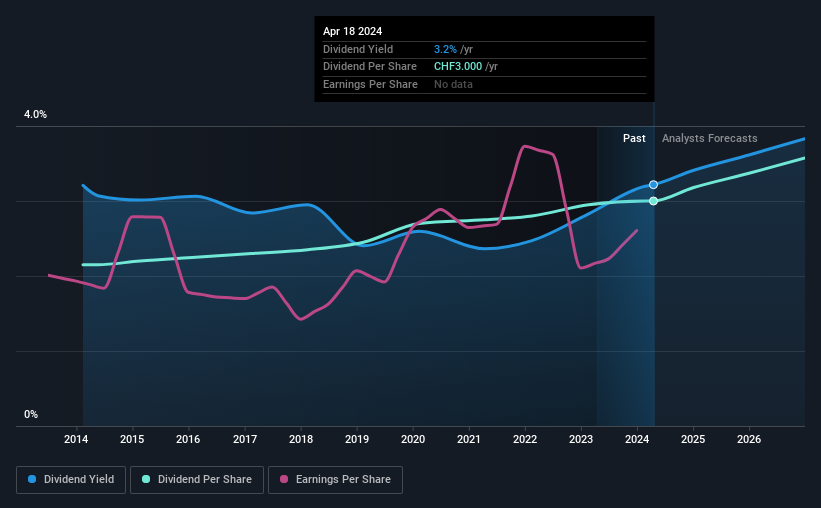Stock Analysis
- Switzerland
- /
- Food
- /
- SWX:NESN
Should Income Investors Look At Nestlé S.A. (VTX:NESN) Before Its Ex-Dividend?

It looks like Nestlé S.A. (VTX:NESN) is about to go ex-dividend in the next two days. The ex-dividend date is usually set to be one business day before the record date which is the cut-off date on which you must be present on the company's books as a shareholder in order to receive the dividend. The ex-dividend date is an important date to be aware of as any purchase of the stock made on or after this date might mean a late settlement that doesn't show on the record date. Meaning, you will need to purchase Nestlé's shares before the 22nd of April to receive the dividend, which will be paid on the 24th of April.
The company's upcoming dividend is CHF03.00 a share, following on from the last 12 months, when the company distributed a total of CHF3.00 per share to shareholders. Calculating the last year's worth of payments shows that Nestlé has a trailing yield of 3.2% on the current share price of CHF093.24. Dividends are a major contributor to investment returns for long term holders, but only if the dividend continues to be paid. That's why we should always check whether the dividend payments appear sustainable, and if the company is growing.
View our latest analysis for Nestlé
If a company pays out more in dividends than it earned, then the dividend might become unsustainable - hardly an ideal situation. Nestlé is paying out an acceptable 71% of its profit, a common payout level among most companies. Yet cash flows are even more important than profits for assessing a dividend, so we need to see if the company generated enough cash to pay its distribution. Over the last year, it paid out more than three-quarters (80%) of its free cash flow generated, which is fairly high and may be starting to limit reinvestment in the business.
It's encouraging to see that the dividend is covered by both profit and cash flow. This generally suggests the dividend is sustainable, as long as earnings don't drop precipitously.
Click here to see the company's payout ratio, plus analyst estimates of its future dividends.

Have Earnings And Dividends Been Growing?
Companies with consistently growing earnings per share generally make the best dividend stocks, as they usually find it easier to grow dividends per share. If earnings decline and the company is forced to cut its dividend, investors could watch the value of their investment go up in smoke. With that in mind, we're encouraged by the steady growth at Nestlé, with earnings per share up 4.9% on average over the last five years. A high payout ratio of 71% generally happens when a company can't find better uses for the cash. Combined with slim earnings growth in the past few years, Nestlé could be signalling that its future growth prospects are thin.
Another key way to measure a company's dividend prospects is by measuring its historical rate of dividend growth. Since the start of our data, 10 years ago, Nestlé has lifted its dividend by approximately 3.4% a year on average. It's encouraging to see the company lifting dividends while earnings are growing, suggesting at least some corporate interest in rewarding shareholders.
To Sum It Up
Has Nestlé got what it takes to maintain its dividend payments? Earnings per share have been growing modestly and Nestlé paid out a bit over half of its earnings and free cash flow last year. All things considered, we are not particularly enthused about Nestlé from a dividend perspective.
If you're not too concerned about Nestlé's ability to pay dividends, you should still be mindful of some of the other risks that this business faces. For example - Nestlé has 1 warning sign we think you should be aware of.
If you're in the market for strong dividend payers, we recommend checking our selection of top dividend stocks.
Valuation is complex, but we're helping make it simple.
Find out whether Nestlé is potentially over or undervalued by checking out our comprehensive analysis, which includes fair value estimates, risks and warnings, dividends, insider transactions and financial health.
View the Free AnalysisHave feedback on this article? Concerned about the content? Get in touch with us directly. Alternatively, email editorial-team (at) simplywallst.com.
This article by Simply Wall St is general in nature. We provide commentary based on historical data and analyst forecasts only using an unbiased methodology and our articles are not intended to be financial advice. It does not constitute a recommendation to buy or sell any stock, and does not take account of your objectives, or your financial situation. We aim to bring you long-term focused analysis driven by fundamental data. Note that our analysis may not factor in the latest price-sensitive company announcements or qualitative material. Simply Wall St has no position in any stocks mentioned.
About SWX:NESN
Nestlé
Nestlé S.A., together with its subsidiaries, operates as a food and beverage company.
Solid track record established dividend payer.

